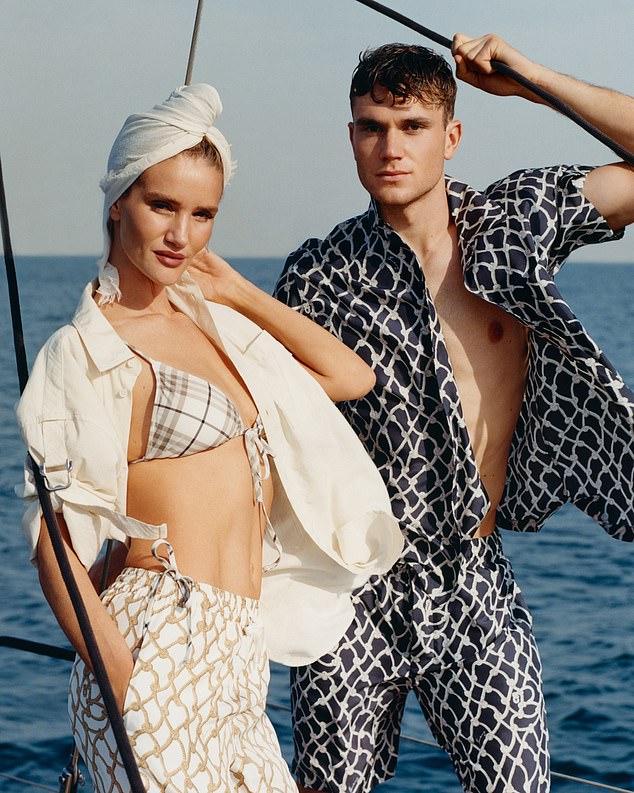[ad_1]
Joshua Schulman, the chief executive of Burberry, can stride into next Wednesday’s annual meeting with a spring in his step.
The share price of the iconic British fashion house has soared by 40 per cent since Schulman, an American, arrived almost exactly a year ago.
When he was drafted in, Burberry was at the nadir of its fortunes following an ill-fated excursion into pointlessly expensive handbags.
But, against the background of a global slowdown in demand for luxury goods, Schulman – the former head of the US fashion houses Coach and Michael Kors – is engineering a turnaround by heavily emphasising Burberry’s quintessential British spirit and 169 years of tradition.
The new focus is outerwear, particularly Burberry’s iconic trench coats, while the trademark check is also back.
Schulman has said of this return to the brand’s roots: ‘Burberry has the most opportunity where we have the most authenticity.’

Rosie future?: Burberry’s trademark check has returned as fashion brand emphasises its quintessential British spirit
In tune with this, its summer campaign features British tennis player Jack Draper and model Rosie Huntington-Whiteley sporting Burberry check swimwear.
Anna Farmbrough, manager of the Ninety One UK Alpha Fund, said: ‘Burberry was suffering from self-inflicted and cyclical issues. But Schulman is laser-focused on articulating what the business really needs. There is a sense of enthusiasm, and the strategy is clearer than it’s been for a decade.’
Burberry’s full-year results, unveiled in May, showed a fall in sales and a £3 million loss. But Nick Train, lead manager at Lindsell Train, Burberry’s largest shareholder with a 6.1 per cent stake, said that the figures represented a ‘brand execution crisis, not a financial crisis’.
However, Schulman can expect tough questions from investors about his cost-cutting efforts, which have put 1,700 jobs at risk worldwide, including 170 at the firm’s West Yorkshire factory.
Some analysts also question the renewed emphasis on the trench coat, usually bought only once in a lifetime. They argue that a fashion house should draw in repeat customers with seasonal trends. For his part, Schulman has said ‘Burberry’s best days are ahead and that we will deliver sustainable profitable growth over time.’
He has put his money where his mouth is, spending about £300,000 of his £1.2 million bonus on Burberry shares, which are now £12.18. This is 23 per cent below their level a decade ago, shortly after the departure of Angela Ahrendts, who turned Burberry into a global luxury player during her eight years as chief executive.
She is now the lead independent director at quintessential American label Ralph Lauren.
Does she dream of a Burberry and Ralph Lauren get-together in a transatlantic marriage of outfitters for the moneyed classes? That’s the chat, and maybe Schulman should be ready for questions on such bid approaches.
DIY INVESTING PLATFORMS

AJ Bell

AJ Bell
Easy investing and ready-made portfolios

Hargreaves Lansdown

Hargreaves Lansdown
Free fund dealing and investment ideas

interactive investor

interactive investor
Flat-fee investing from £4.99 per month

InvestEngine

InvestEngine
Account and trading fee-free ETF investing
Trading 212
Trading 212
Free share dealing and no account fee
Affiliate links: If you take out a product This is Money may earn a commission. These deals are chosen by our editorial team, as we think they are worth highlighting. This does not affect our editorial independence.
[ad_2]
This article was originally published by a www.dailymail.co.uk . Read the Original article here. .

